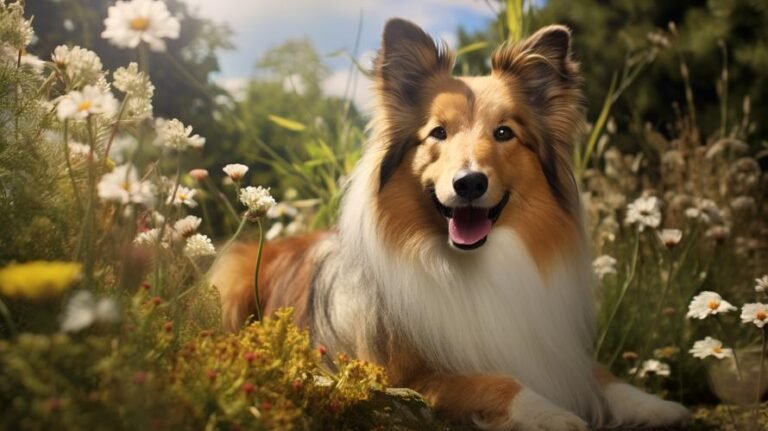What if I told you that a Spaniel, a Labrador, and a Shetland Sheepdog have one big difference when it comes to their meals? You might think, all dogs are the same, right? With their furry bodies and endearing eyes, it’s easy to think that what’s good for one is good for the other. But, guess what? That’s not always the case, especially when it comes to feeding these adorable creatures.
So, what’s the secret of feeding a Shetland Sheepdog? Let’s unravel this mystery.
If you are a Sheltie owner (or aspiring to be one), you’ve probably asked yourself the question: Does a Shetland Sheepdog need special dog food? Your curiosity is not unfounded, mainly because of the unique qualities of this breed. Shetland Sheepdogs, fondly called Shelties, hold a distinct place in the canine world. Their vibrant energy, coupled with their sensitivity and intelligence, make them compelling dogs to care for. These factors significantly influence their dietary needs, but are they enough to warrant special dog food?
Unraveling the Sheltie Breed
A Sheltie’s dietary needs are, to an extent, deeply ingrained in their breed’s history and physiology. Shetland Sheepdogs originated from the Shetland Islands of Scotland, where they were initially bred as herding dogs. These islands are notorious for their harsh weather conditions, which significantly contributed to the Shelties’ small size, thick double coats, and high energy levels.
As a herding dog, a Sheltie was bred to spend hours, under inclement weather, driving livestock. This unforgiving routine made these dogs develop a very active lifestyle, which is reflected in their modern descendants today. Shelties are vigourous dogs with an innate need for physical activity and mental stimulation.
Understanding their background reveals that their metabolism is naturally faster than most dog breeds, meaning they require more caloric intake relative to their weight. However, this doesn’t necessarily mean that a Shetland Sheepdog needs special dog food. Instead, it implies a need for a well-balanced and high-quality diet that can cater to their specific needs.
Energy and Diet Requirements
A Sheltie tears around the backyard with boundless energy, playing fetch, and even outpacing some larger dog breeds. High energy equals high caloric requirements, right? In principle, yes, but one has to be careful here. The lifestyle of a city Sheltie dramatically differs from those on a farm. If a Sheltie is more of a couch potato than a sprinter, overfeeding could lead to weight gain and possible obesity. Remember, even though they have high-energy ancestry, if they aren’t getting much exercise, they will gain weight just like any other inactive dog.
Shelties need about 900-1200 calories per day, adjusted based on their activity levels. Less active Shelties require fewer calories, while sporty ones need more. These caloric intakes help to regulate their metabolism and keep up with their high energy needs. Basic dog food, high in quality protein and fats, can meet this demand without issue.
Special Dietary Considerations
Beyond their energetic disposition, Shelties have a couple of traits that set them apart from other canines. They have a lush double coat and, unfortunately, are predisposed to certain genetic issues such as hip dysplasia and potential thyroid and skin problems.
Their magnificent fur requires a diet rich in Omega-3 and Omega-6 fatty acids to remain glossy and healthy, which means you might need to supplement their meals with fish oil or flaxseed. Dog foods rich in protein and natural fats also have these nutrients and are usually sufficient for Shelties.
As for their genetic issues, experts suggest foods fortified with glucosamine and chondroitin to support bone health and help reduce the risk of hip dysplasia. For potential thyroid and skin problems, supplements like probiotics, fish oil, Vitamin E and biotin can help. However, it is crucial to consult with your vet before starting any supplement regime.
The Verdict
So, does a Shetland Sheepdog need special dog food? The honest answer is no. Instead, their unique diet includes high-grade dog food enriched with the right nutrients—in the appropriate quantities—to cater to their high energy, luscious coats, and unique health concerns.
Understanding your Sheltie’s dietary demands is the first step in ensuring a long, happy, and healthy life. After all, what goes into their bowl goes right into their wellbeing.
Lesson learned? Dogs are as unique as the people who love them. Providing the right diet for your Sheltie—or any dog—isn’t about offering “special” food, but about understanding their unique needs, breed traits, and potential health issues. Your Shetland Sheepdog might not need special dog food, but they certainly deserve a special kind of care and love. And, part of that involves ensuring they have the best diet possible for a long, healthy, and happy life.



